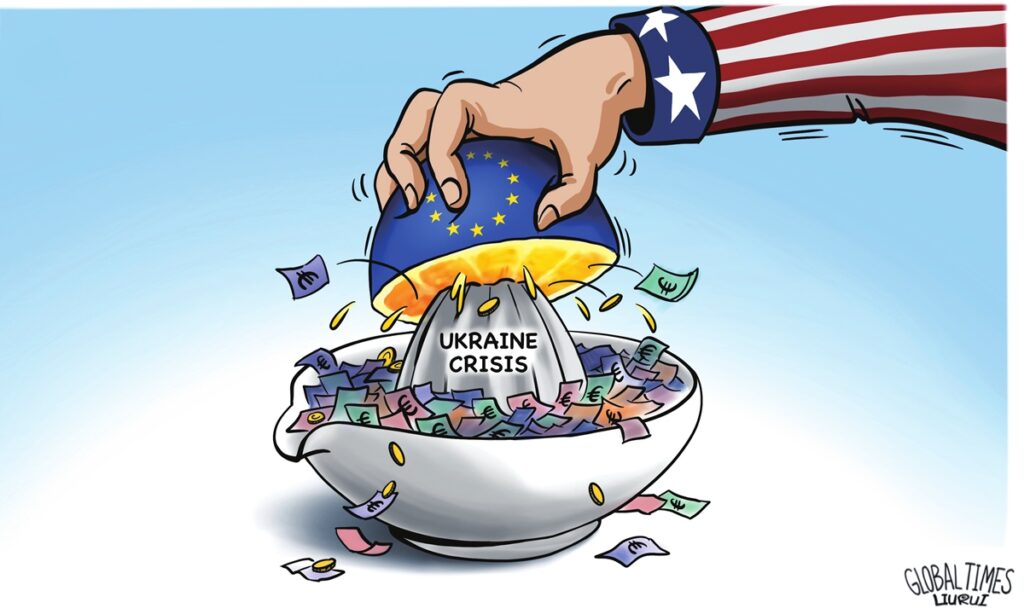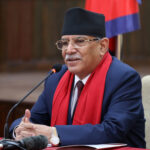How US uses lies to manipulate the Russia-Ukraine conflict
The Russia-Ukraine conflict has lasted for a year since it broke out in February 24, 2022, which has had a profound impact globally.
The conflict was spreading and peace negotiations are still far off. The tanks, missiles and other more sophisticated weapons provided by the US and NATO continue to reach the battlefield, while Russia is mobilizing more personnel to participate in the “special military operations” …
There is no end in sight to the conflict “which used money from the Europe, costed Ukrainians’ lives, brought wealth to the US but suffering to the entire world.”
For a year, the people of Ukraine and Europe have been suffering, but the rising calls for a cease-fire have not deterred the US from insisting on “fighting to the last Ukrainian.” The harsh reality in the past year has given the world a clearer understanding of the US’ hegemonic narrative.
The Cold War mentality, which has not receded since the end of the Cold War, combined with hegemony, has led to the continuous expansion of NATO, which should have ended its mission, as it goes against the direction of the global public interest. In the past 30 years, the phenomenon of the grotesque kidnapping of global security with lies and continuing of cold war-style confrontation has emerged endlessly in the US hegemony.
Absurdity No.1: kidnapping war with stories
For a year, the US defined the conflict between Russia and Ukraine by “the war between democracy and despotism,” which has dominated the US and the Western society. Immersed in a carefully choreographed narrative, many people in the West do not know that it was the US-led NATO that gradually lured Russia into conflict with Ukraine over the past few decades.
After the “proxy conflict,” the US and its NATO allies have been agitating the public, “kicking up a fuss” and “handing out knives” with huge amounts of military aid, and use the continuation of the conflict to drive NATO’s “revival” and sustain hegemony.
US military analysts have long believed that the outcome of modern warfare depends not only on whose army wins, but also on “whose story wins.”
In the words of former US Secretary of State Mike Pompeo, it is that “we cheated.” From the “baby incubator” story fabricated by the US before the use of force against Iraq in 1990, to a staged video of the “White Helmets” cited as evidence to wage wars in Syria, there are many cases of US kidnapping public opinion with lies, which are closely associated with the US’ foreign strategy.
It’s the same story again in the Russia-Ukraine conflict. The US and the West have made up a number of striking and provocative “stories to defame Russia.” For example, the video of a Turkish drone strike on the Syrian army was described as a Russian tank being destroyed on a Ukrainian battlefield. The video of a Russian military exercise in April 2021 was fabricated as Russia shelling Ukrainian cities. The pictures of children wounded in Syrian air strikes in 2018 were fabricated as Ukrainian “children in pain.”
Absurdity No.2: using “hegemonic stability theory” to create world turmoil
The Western international political discourse has created concepts such as “Security dilemma,” “Thucydides trap” and “Kindleberger trap” for decades, which all served the same purpose – the continued stability of hegemony.
However, there is a huge gap between concept and reality. The narrative of “peace” and “development” has never been absent in US statement, but it has become an illusion in the US’ pursuit of hegemony, and even become a tool to promote hegemony. Looking back during the 30 years since the end of the Cold War, the world could have enjoyed a promising “long-term peace,” but humanity has not enjoyed real peace and tranquility and is still experiencing ongoing conflicts and crises.
After the Russia-Ukraine conflict, the US and Europe provided military aid to Ukraine, and used their financial hegemony to impose the most severe economic and financial sanctions on Russia in history, including freezing hundreds of billions of dollars in Russian foreign exchange reserves and kicking Russia out of SWIFT. These moves did not bring Russia to its knees, but triggered drastic fluctuation in international energy and financial markets.
The dollar has been the world’s dominant reserve currency. However, the US has long abused this position to seize other countries’ wealth. In just one and a half years since the outbreak of COVID-19, the US has printed nearly half of all the dollars in circulation over its more than 200 year history, leading the world to undertake pressures caused by inflation, turbulence and bubbles that it should not have.
The US privatized and weaponized the public good — global financial system in the geopolitical conflicts to deal with hostile countries and substate actors. This is worse than Britain, which was “the hegemonic power” incapable of providing international public goods between the two world wars.
Absurdity No 3: using “international order” to beautify “unilateral law and rules of small cliques”
The post-World War II international order is often described as a product of US power. The victorious nations, the US and its allies, impose their will on the rest of the world, formulating institutions and norms that serve their interests and ensure their supremacy.
The US and the West regard themselves as “spokesmen of the international community” and are accustomed to labeling some countries with discriminatory labels such as “Evil Empire,” “Axis of Evil,” “Rogue State” and “Failed State” in order to distinguish the so-called “civilized self” from ” the savage others.” While demonizing other countries, they regard themselves as the moral arbiter of the world; in front of the scenes it is about “freedom and democracy,” and behind the scenes is the ambition of unending hegemony.
The Russia-Ukraine conflict, which broke out under the long-term containment and high pressure of the US and NATO, has been described by some Western politicians as an “epic” of “democracy versus autocracy.” Not only that, NATO also used the word “challenge” to describe China for the first time, falsely claiming that China challenged NATO’s interests, security and values, and joined forces with Russia to “undermine the rules-based international order.”
Absurdity No. 4: quelling “hegemonic anxiety” by selling “fear”
From James Monroe who is known for his Monroe Doctrine, to Theodore Roosevelt who claimed that “every expansion of civilization makes for peace” ,and to Joe Biden who touts about “democracy” and “freedom” today, US elites generations after generations relentlessly sell the beacon of freedom as they expand territory and grab for hegemony, but at the same time they also hype up all kinds of fears.
From the “barbarian fear” during the massacre of Indians to the “Islamic fear” during the War on Terror, from the “communist fear” during the Cold War to the “fear” of “China’s challenge to rules and order” today, all that the US wants is to profit economically and maintain its hegemony amid fear and chaos.
Exaggerating “fear” reflects the anxiety of the US as a hegemon. In a strategic culture that is keen to “find the enemy,” the law of the jungle, the Cold War mentality, and the zero-sum game are always lingering in the minds of US politicians, and their sense of insecurity that US hegemony would be replaced and threatened is always lingering.
Recently, a Chinese civilian airship strayed into US airspace due to force majeure. Although many US officials stated that the Chinese balloon did not pose a threat to US personnel and security, this incident was exploited. The US dispatched advanced fighter jets, and even took this opportunity to engage in political manipulation, smear and attack China, incite an anti-China atmosphere, and staged a hysterical “balloon political show.”
Standing on the side of peaceful dialogue, human society must not go back to the old path of camp confrontation and division, and must not fall into the trap of zero-sum games and war conflicts. This is the strong desire of the people of all countries, the common responsibility of all countries in the world, and the correct direction of the development of the times.
Major powers can engage in competition, but should do it in a graceful way. German Chancellor Olaf Scholz once said in an article that the central question for Europeans and as the European Union is how they can remain independent actors in an increasingly multipolar world, that China’s rise does not warrant isolating Beijing or curbing cooperation, and that we must also avoid the temptation to once again divide the world into blocs.
Facing the great changes in history, all countries in the world are facing challenges. Only by adhering to the just narrative that keeps pace with history and shares the fate of the times, and act together, can we win a bright future.
(Global Times)




